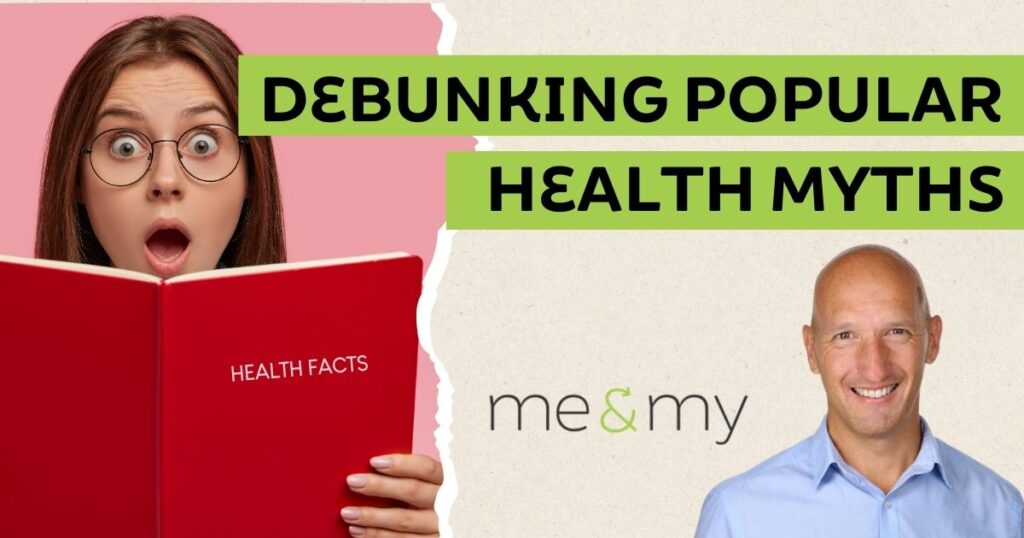Debunking Popular Health Myths: Discover the True Path to Holistic Wellbeing

The wellness journey is often clouded by numerous health myths, propagated through various channels including healthcare professionals, social media, and traditional educational systems.
Inspired by the insights shared by Anthony Hartcher, host of the me&my health up podcast, this blog post aims to delve deep into these misconceptions. Join us as we explore and illuminate the truths that can lead us towards genuine health enlightenment.
Watch the full podcast episode:
Debunking Dietary Misconceptions

One of the most pervasive health myths concerns the intake of saturated fats and cholesterol. Contrary to common belief, not all saturated fats are detrimental to our health. Emerging research suggests that these fats, when sourced responsibly, may not be the villain they’re often portrayed as.
Likewise, the myth that cholesterol is inherently bad is oversimplified. Our bodies need cholesterol for various biological functions, and it’s the balance of its intake and our lifestyle that matters.
Sunlight and Vitamin D: Beyond the Myths

Another widespread misconception is about sunlight exposure. The advice to shun the sun completely overlooks the benefits of vitamin D, essential for bone health, immune function, and more.
While excessive sun exposure can lead to skin damage, moderate exposure is crucial for vitamin D synthesis, challenging the blanket recommendation to avoid the sun.
Rethinking Water Consumption Guidelines

The ‘eight glasses a day’ water intake rule has been etched into our minds, but this guideline fails to consider individual differences such as activity level, climate, and dietary intake.
Understanding that hydration needs are personal and variable allows us to tune into our bodies’ actual requirements rather than following a one-size-fits-all approach.
Caloric Intake and Energy Needs

The general guidelines on caloric intake are often derived from outdated studies that do not account for modern sedentary lifestyles or individual metabolic variations.
Recent discussions suggest that the breatharian approach, though extreme, highlights that humans might have alternative energy sources beyond conventional food intake like converting sunlight directly into metabolic energy through practices such as earthing and sunlight exposure.
The Truth About Meal Frequency

Historically, the frequency of our meals has evolved from the Romans’ one meal a day to the multiple meals dictated by the industrial and post-industrial lifestyle changes.
These shifts were less about nutritional science and more about work schedules and social changes, indicating that the optimal number of daily meals might be more flexible than traditionally thought.
Mitochondrial Health and Longevity

Focusing on mitochondrial health offers profound insights into longevity and vitality. Calorie restriction, previously thought to be a mere weight loss tactic, has shown potential in enhancing mitochondrial function, thereby improving health and extending lifespan.
This approach challenges the conventional wisdom that associates more frequent eating with better health.
Harnessing Environmentally Sourced Energy

Exploring unconventional sources of energy such as those derived from grounding and sunlight is revolutionary. It turns out that our bodies can absorb electrons directly from these sources, potentially reducing our reliance on food as the sole energy supplier.
Confronting Health Myths with Personalised Wellness
Every individual’s health journey is unique, making it crucial to adopt a personalised approach to diet, sunlight exposure, and physical activity. By understanding our bodies’ unique reactions to various environmental factors, we can tailor our health strategies to align more closely with our personal needs rather than relying solely on general guidelines.
Conclusion
In an age where misinformation is rampant, questioning and scientifically investigating health myths is crucial. Whether it’s reevaluating how much water to drink, reconsidering our calorie needs, or exposing ourselves to sunlight, it’s imperative that we seek information from diversified, credible sources.
Embracing a holistic view of health allows us to not only debunk myths but also pave the path to a genuinely healthy lifestyle.
Tailored Holistic Health Coaching at me&my wellness
At me&my wellness, we understand that each wellness journey is unique. That’s why we offer holistic health coaching, meticulously tailored to meet your individual health and wellness goals.
Our approach ensures that every strategy is personalised, debunking one-size-fits-all health myths and guiding you towards true well-being. Ready to transform your health? Book a 15-minute FREE consultation with us today and start your personalised wellness journey.

